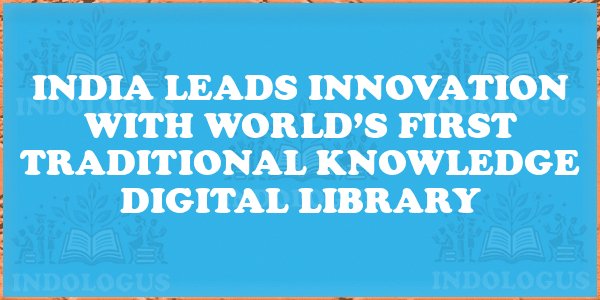India has made history by launching the world’s first Traditional Knowledge Digital Library (TKDL), utilizing modern digital tools like Artificial Intelligence (AI) to preserve and promote its rich traditional medicine systems. The initiative has garnered global recognition from the World Health Organization (WHO) for its groundbreaking approach to healthcare innovation.
A New Era of Traditional Medicine
The Traditional Knowledge Digital Library (TKDL) is a pioneering online platform that consolidates ancient wisdom from traditional systems such as Ayurveda, Unani, Siddha, Sowa Rigpa, and Homoeopathy. By integrating AI-based technologies, the library organizes and interprets historical texts and practices, facilitating easier access and application of this valuable knowledge in contemporary healthcare.
- The TKDL aims to prevent the misuse of traditional Indian medicine and facilitate scientific research.
- It enables the exploration of new medicinal avenues by analyzing the efficacy of age-old remedies through a modern scientific lens.
WHO Commends India’s AI Integration in Ayush
The WHO has lauded India for its adoption of AI in revolutionizing traditional medicine, as highlighted in the report “Mapping the Application of Artificial Intelligence in Traditional Medicine.” The report showcases AI applications like pulse diagnostics, tongue analysis, and Prakriti assessment through machine learning techniques.
- Ayurgenomics, a novel field merging genomics with Ayurveda for personalized healthcare recommendations, represents a significant advancement.
- AI is instrumental in identifying new therapeutic uses of herbal medicines for modern ailments.
Government Advocacy and Global Impact
Prime Minister Narendra Modi’s endorsement of AI for societal welfare, particularly in healthcare, underscores India’s commitment to inclusive technological progress. At the GPAI Summit, India articulated the vision of “AI for all,” emphasizing the integration of modern technology with traditional wisdom in healthcare.
- The Ministry of Ayush underscores India’s dedication to fostering innovation and enhancing global healthcare by blending traditional and contemporary healthcare systems.
- Union Minister Prataprao Jadhav acknowledges India’s pioneering efforts in driving innovation and advancing global healthcare through a harmonious fusion of traditional and modern methodologies.
Implications for Global Healthcare
The TKDL and India’s AI initiatives in traditional medicine serve as a global benchmark for safeguarding and expanding ancient knowledge repositories. The application of AI enables India to juxtapose systems like Ayurveda with Traditional Chinese Medicine (TCM), leading to innovations such as artificial sensors for assessing traditional qualities like Rasa, Guna, and Virya.
- WHO commends India’s digital platforms for facilitating online consultations, supporting Ayush practitioners, and bridging traditional and modern healthcare paradigms.
Key Takeaways for Competitive Exams:
- India establishes the world’s first Traditional Knowledge Digital Library (TKDL) to preserve traditional medicine.
- The integration of AI in Ayush practices garners global recognition from the World Health Organization (WHO).
- Ayurgenomics emerges as a cutting-edge field combining genomics and Ayurveda for personalized healthcare solutions.
- India’s leadership in harmonizing traditional wisdom with modern technology sets a precedent for global healthcare innovation.



